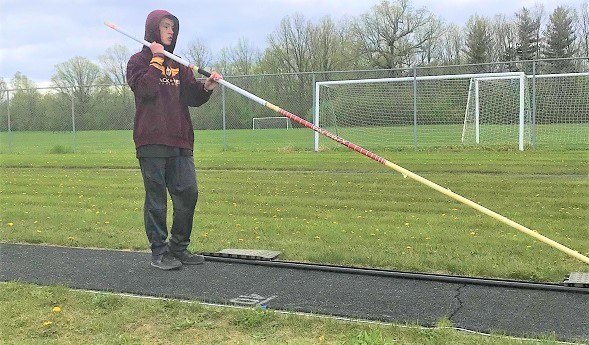
Blind Vaulter Builds on Promising Launch
By
Paul Costanzo
Special for MHSAA.com
May 24, 2019
When Bradly Rainwater’s family members learned he was born blind, they decided to not put any limits on him.
 As it turned out, Bradly had the same mindset.
As it turned out, Bradly had the same mindset.
The Davison sophomore is a pole vaulter on the track & field team. It’s an event that he took up not just because his father and uncle were former all-state pole vaulters, but because it was one of the most difficult events in any sport.
“I have always gone after the hardest things,” Rainwater said. “I thought this would be another thing that I would see if I could do it.”
Rainwater, who also is a member of the marching band and wrestling teams at Davison, recently finished his first full season competing as a vaulter and has proven that he can do it, with a personal best of 8 feet, 6 inches. But he’s not satisfied with simply clearing a height in competition – he wants to go higher.
“In the end, I’d like to go to state and get a reasonable placing,” Rainwater said of his career goals. “That would be good for me. I’d enjoy that. For someone in a situation like mine, or a situation similar, you have to work twice as hard to get things where you want them to be. But I am dedicated to it.”
Davison pole vaulting coach Brad Rainwater, Bradly’s grandfather, is also dedicated to it, and is doing all he can to help his grandson reach his goals. Brad Rainwater has been coaching for four decades, but had to teach himself some new tricks when Bradly came along.
“It’s a learning process for us, as well,” Brad Rainwater said. “We started by putting our heads together, my sons and I, and I took it basically like I would coach anyone, but we had to be more hands-on. Basically, it’s step-by-step. It’s the same way when he wrestles; they have to literally do every movement like step, step, step, step. Everything on the vault is done by steps, so we start him with doing three steps, then four steps, then five steps. We’re thinking of ways to teach him to turn, so we use a lot of rings and high bar so he can get that feel.
“What it’s done for me is made me a better coach, because I have to break everything down. Now I’m a little more technical with them all.”
Recently, Bradly began using a track on the runway to help guide his pole to the box, which allows him to start his run farther back. He’s made steady improvement throughout the season, setting his personal best May 13 during a dual meet against Flint Carman-Ainsworth and matching it two days later at the Heritage Hawks Last Chance Invitational.
During practices with a bungee cord, he has cleared more than 10 feet. He’s also started imparting wisdom on other vaulters.
“If I have young vaulters, he teaches them the first three steps and a plant,” Brad Rainwater said. “If people are around (Bradly) and they didn’t know he was blind, because he’s actually doing the drills or showing kids how to do drills, they go, ‘He’s blind?’”
Bradly said the reaction from teammates and opponents alike has been great.
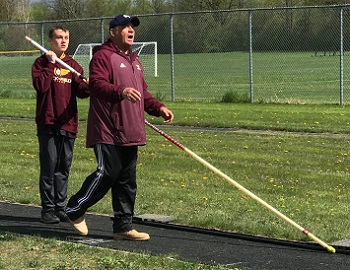 “They work with me some, like they’ll say, ‘You didn’t turn correctly,’ or ‘You didn’t do this correctly,’ which I appreciate, because criticism like that I can’t necessarily see on film,” he said. “Opponents, some of them come up to me and say thank you to me, and that I inspired them. It’s still hard for me to grasp, because I’m not as good as I should be, but I appreciate people saying that.”
“They work with me some, like they’ll say, ‘You didn’t turn correctly,’ or ‘You didn’t do this correctly,’ which I appreciate, because criticism like that I can’t necessarily see on film,” he said. “Opponents, some of them come up to me and say thank you to me, and that I inspired them. It’s still hard for me to grasp, because I’m not as good as I should be, but I appreciate people saying that.”
While there’s no official number of blind individuals who have competed in the pole vault, it is rare.
“I know that he’s only one of maybe three others in the state (history), and the other three had some sight,” Brad Rainwater said. “We try not to limit him; we try not to put him in a box that he can or can’t do that. As far as I know, he’s one of the very few in the country that’s doing this. We love it, because we hope it opens doors for other kids that have desire to do other things.”
Bradly, however, said he hasn’t quite grappled with the fact that what he’s doing is special, as he feels he still needs to get better. That’s his focus now, and it’s reflective of someone who has played sports his entire life, from T-ball to soccer to basketball, and now wrestling and track.
He’s not a blind pole vaulter; he’s simply a pole vaulter. And when he’s done, he wants to be known as a great one.
“I’ve always had the attitude of why not,” he said. “Why not work extra hard to be as good as they are?”
 Paul Costanzo served as a sportswriter at The Port Huron Times Herald from 2006-15, including three years as lead sportswriter, and prior to that as sports editor at the Hillsdale Daily News from 2005-06. He can be reached at [email protected] with story ideas for Genesee, Lapeer, St. Clair, Sanilac, Huron, Tuscola, Saginaw, Bay, Arenac, Midland and Gladwin counties.
Paul Costanzo served as a sportswriter at The Port Huron Times Herald from 2006-15, including three years as lead sportswriter, and prior to that as sports editor at the Hillsdale Daily News from 2005-06. He can be reached at [email protected] with story ideas for Genesee, Lapeer, St. Clair, Sanilac, Huron, Tuscola, Saginaw, Bay, Arenac, Midland and Gladwin counties.
PHOTOS: (Top) Davison pole vaulter Bradly Rainwater lines up for an attempt this spring. (Middle) Rainwater works with his grandfather Brad Rainwater, the school’s longtime pole vaulting coach. (Photos and video provided by the Rainwater family.)
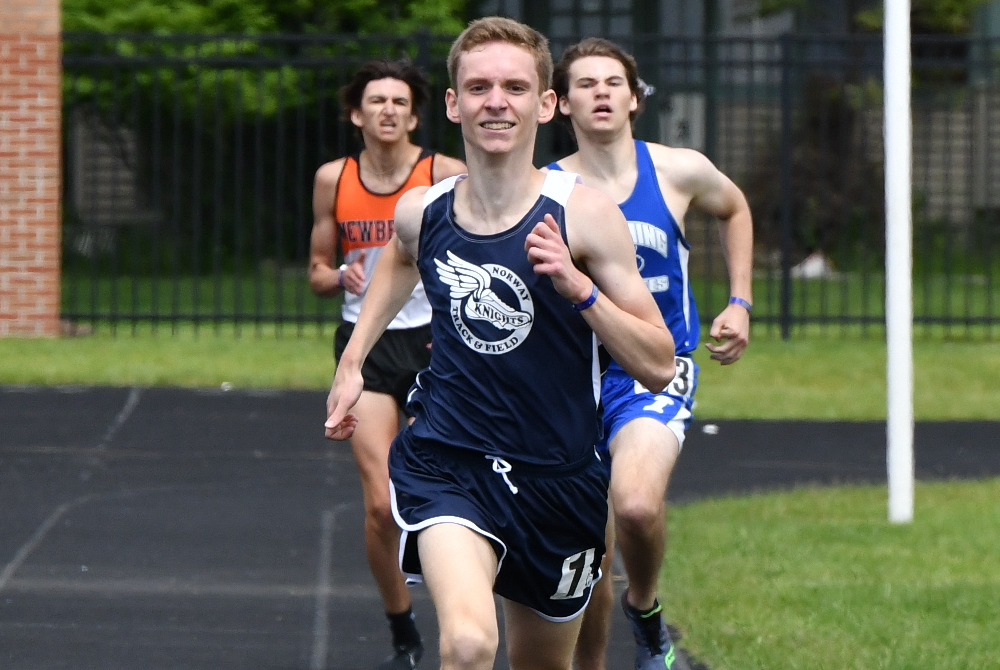
Ishpeming, Norway Race to Shared Finals Fame
By
John Vrancic
Special for MHSAA.com
June 6, 2021
KINGSFORD — The Ishpeming boys are used to winning Upper Peninsula track & field championships.
They came into Saturday’s U.P. Division 2 Finals as two-time reigning champs and had won five titles over six seasons prior to last year when all spring sports were cancelled due to COVID-19.
This time the Hematites and Norway shared the title with 95 points each. Third-place Iron Mountain had 85.
For Norway, this was its first championship since 2004.
“Not bad for us, especially with having just 10 boys,” said Norway coach Al Trudeau. “At the beginning of the year we weren’t expecting this. We had a great bunch of kids who worked hard. We had a great year.”
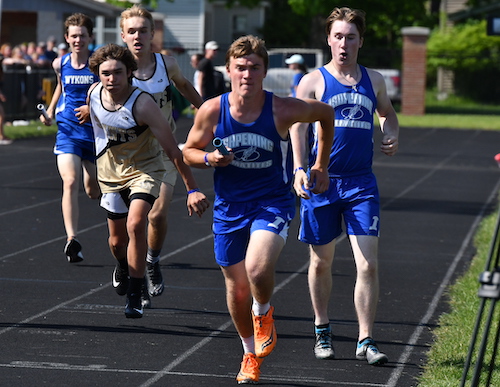 Norway junior Adam Cavaghetto, who returned midseason following a blood disorder, won the 800-meter run in two minutes, 5.06 seconds and the 1,600 (4:38.59).
Norway junior Adam Cavaghetto, who returned midseason following a blood disorder, won the 800-meter run in two minutes, 5.06 seconds and the 1,600 (4:38.59).
Ishpeming’s David Liimatta took the 400 (54.16) and placed second in the 800 (2:07.57) and 1,600 (4:41.42), and Silas Broberg was first in the 3,200 (10:50.91).
The Hematites also won the 1,600 relay (3:47.52) and 3,200 relay (9:25.34).
“We had a good day,” said Ishpeming coach P.J. Pruett. “Overall, our kids did well.”
Iron Mountain enjoyed much of its success in the sprints with senior Dante Basanese taking the 200 (23.84) and sweeping the speed relays.
“Our handoffs felt pretty good,” said Basanese, who anchored the winning 800 relay. “We had four good sprinters who definitely ran real hard.
“Norway has a good team. We felt they were the team to beat.”
The Mountaineers were clocked at 1:35.1 in the 800 relay with Norway the runner-up (1:37.99). They also took the 400 relay (45.05).
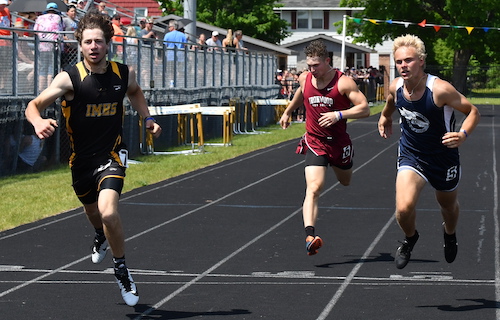 Iron Mountain won the Regional at West Iron, and Norway was crowned champion at Ishpeming.
Iron Mountain won the Regional at West Iron, and Norway was crowned champion at Ishpeming.
St. Ignace got firsts from Christian Koiveniemi in the 100 (11.79), who edged Gwinn’s Max Jayne by one hundredth of a second, and Trevor Visnaw in pole vault at nine feet. Basanese was third (11.82) in the 100.
Newberry’s lone champion was Eric Edwards in shot put (40-4½), and David Duvall provided Gwinn with its only first in the 110 hurdles (17.81), followed by Norway’s Wyatt Richter (17.9) and St. Ignace’s Jackson Ingalls (17.93).
L’Anse had a double winner in Nathan Hochstein, who took high jump at 5-9 and long jump at 18-9½. Eli Ostermeyer added a first in discus (114-11) and a second in shot put (37-9¼).
West Iron’s champion was Landon Sudelius in the 300 hurdles (43.58).
PHOTOS: (Top) Norway's Adam Cavaghetto travels the final stretch in winning the 1,600. (Middle) Ishpeming's Jordan Longtine hands off to Hunter Smith during the 3,200 relay. (Below) Iron Mountain's Dante Basanese wins the 200 with Norway's Jeffrey VanHolla taking second. (Photos by Cara Kamps. Click to see more at RunMichigan.com.)

